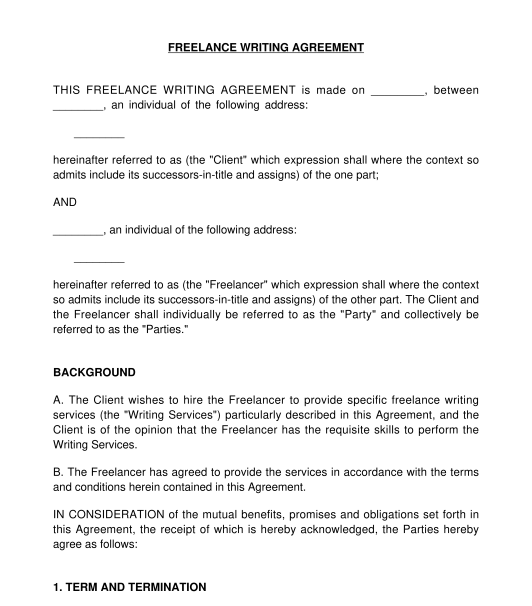 30/10/2025
30/10/2025

Answer a few questions and your document is created automatically.

Your document is ready! You will receive it in Word and PDF formats. You will be able to modify it.

 30/10/2025
30/10/2025
 Word and PDF
Word and PDF
 8 to 12 pages
8 to 12 pages



The Freelance Writing Agreement is a document used to outline the terms of a writing contract with a freelancer. A freelancer writer is a person contracted by the client to provide specific writing services for the client, usually for a specified period. In this document, the freelance writer may be contracted to write article, book, essay, writing articles, newspaper articles, business proposals, or other written work.
The freelancer is not an employee of the client but an independent contractor who controls how they render their services. Clients hire freelancers for specific projects that require the freelancer's skills and expertise. The freelancer may be contracted on a one-off basis for a specific period.
This document should be used in the following circumstance:
This document sets out the terms of the agreement, including the following:
The Freelance Writing Agreement is similar to the Service Agreement because they both involve the hiring an independent contractor to provide specified services. However, this document more specifically relates to freelance writing services while the service agreement is more general in nature. Additionally, the benefits of hiring a freelancer include the provision of high-quality services at a low cost. Unlike an employee, the freelancer is not entitled to employment benefits such as annual leave, insurance, retirement benefits, and allowances. See our article on the difference between an employee and an independent contractor.
This document specifies the terms and conditions of the freelance writing agreement.
The document should be completed by filling the form with the required information, including the scope of the writing service, freelancer's remuneration, and of course, how the agreement will terminate.
After completing the document, it should be printed and signed by the freelancer and the client.
Alternatively, the document may also be signed electronically and delivered to the other party by email.
Each party should keep a signed copy of this agreement for their record.
The Labour Act, 2004 regulates work for hire and employment matters. Also, the rules of general contract apply to this document.
You fill out a form. The document is created before your eyes as you respond to the questions.
At the end, you receive it in Word and PDF formats. You can modify it and reuse it.
Freelance Writing Agreement - FREE - sample template
Country: Nigeria